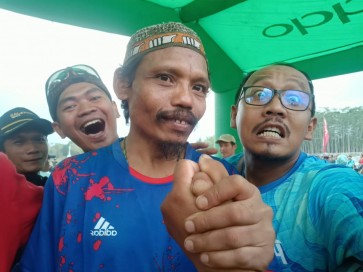Holistic care more accessible for loved ones
Mahdi never frowns around his son Arrian, who was diagnosed with an early stage of leukemia last month
Change text size
Gift Premium Articles
to Anyone

Mahdi never frowns around his son Arrian, who was diagnosed with an early stage of leukemia last month.
The 15-year-old boy, visibly tired after an earlier chemotherapy session, sits calmly on the left side of his gurney. A surgical mask conceals Arrian's expression as Mahdi, still smiling, sits next to him, slinging his arms over his son's shoulder for the father and son picture.
Arrian is just one of around 650 children in Jakarta facing a seeming end from cancer. But if Mahdi can help it, he will never let his son face that possibility.
"He's going to be okay. He must be okay, he has the exams to do," Mahdi said, referring to the ongoing 4-day national exams.
Mahdi's optimism is rational. Children with cancer have a 90 percent survival rate depending on the stage of the disease they are at when they begin treatment. Relapses can still occur, depending on the child's lifestyle after healing.
Mahdi may also be fortunate because of the support his son will receive from Rachel House - a Jakarta-based NGO focusing on palliative care for terminally ill children - and Singapore International Foundation (SIF), which together launched the Singapore Volunteer Overseas specialist team project at Sampoerna Strategic Square, Tuesday.
The project aims to provide better palliative care, a medical term describing holistic care for children with as-of-yet incurable diseases like cancer, by training care givers.
Palliative treatments vary from providing psychological support to giving pain-reducing drugs.
"It is our belief each child deserves to be given the best care, even when his or her remaining days are limited," said Lynna Chandra, the founder of Rachel House at the launch.
As many as 12 medical and nursing staff from Singapore will take part in the training program. Some 28 other practitioners and caregivers of palliative care, paediatric oncology, AIDS and congenital abnormalities will also participate in the two-year program, the first week of which will be held from April 21 to 26 at Dharmais Hospital, with Arrian being one of the children receiving treatment.
According to Lynna, the program marks the start of an era placing greater emphasis on hospices (places providing palliative care) in Jakarta and eventually across the country.
"My goal is to have as many hospices as possible in the country," Lynna said.
Palliative treatment, as part of medical treatment, began in 1992 in Indonesia, directed specifically at people in the later stages of terminal illnesses. These treatments were also restricted to five major hospitals in the country. The Health Ministry only provided a legal basis to conduct hospice care in 2007, with Rachel House currently providing the only free hospice designed specifically for palliative care.
"The idea itself is not revolutionary, but if someone like Lynna can do it, we should start driving the medical community toward it too," said Vebry Lubis, a general practitioner who often helps with patients at Rachel House .
Vebry also commended Dharmais Hospital for providing the venue for the palliative care training, pointing out the pediatric ward on the hospital's fourth floor.
There were playing rooms other than the children's room, equipped with PlayStation consoles and desktop computers. One child had a room wallpapered with pictures of animals and supernatural creatures. At one end of the hallway connecting the children's rooms was an in memoriam board filled with about two dozen pictures of children who did not make it.
When asked whether she had ever cried when taking care of these children, Vebry said she tried not to.
"Of course I've cried sometimes. But only in corners where the kids can't see me. I can't let them see me cry. We have to be strong so they can be too," she said.









